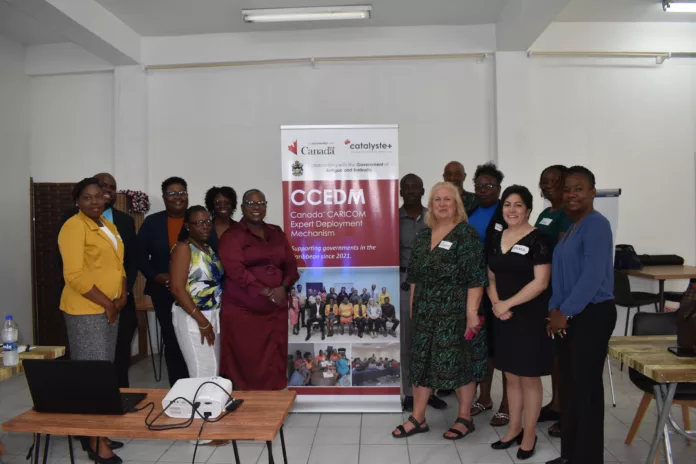
By Samantha Simon
Experts have begun shedding light on the negative impact of gendered language, pointing out how terms such as “hostess” and “manpower” reinforce stereotypes and pose barriers to achieving gender equality.
In light of this, the Directorate of Gender Affairs opened the month of March with a two-day workshop geared towards educating members of the public on gender sensitivity in communication.
This workshop was facilitated with support from experts sent by the Catalyste+ via the Canada-Caricom Expert Deployment Mechanism (CCEDM) programme.
Minister responsible for the Directorate of Gender Affairs, Senator Samantha Marshall, spoke to the importance of the workshop, hosted just days before International Women’s Day to be marked under the theme ‘Inspire Inclusion’.
“Gender norms influence our interactions, so subtle, or sometimes not so subtle, assumptions but regardless of their intent, the impact is often significant. Gender sensitive communication acknowledges diverse experiences and perspectives,” she said.
“We are all shaped by different experiences and backgrounds; communicating in a gender sensitive way helps to create a society where we can all feel seen, respected and valued.”
The workshop addressed the use of gendered language, and how best to use it to ensure that persons feel included as well as to prevent situations of fostering gender bias due to the use of language that encourages stereotyping or trivialisation of any one gender.
Workshop facilitator, Gwen Walmsley, a retired journalist and former communication advisor to the government of Canada, shared her insight into the importance of this training, which is also being carried out in other islands.
“Within society, there are cultural norms that create certain expectations of the roles that men and women play. Very often we tend to repeat these expectations and some of them are negative,” she said.
Walmsley emphasised the importance of respecting individuals’ rights and embracing their unique identities and the detrimental effects of perpetuating negative stereotypes that limit an individual’s roles in the workplace, prescribe rigid dress codes, or dictate acceptable language.
Instead, Walmsley championed gender equality as a catalyst for economic growth and social harmony.
Andrea Benavides, programme manager for Catalyste+ CCEDM, welcomed members of local NGOs and government bodies to reach out for support on projects they may be working on, as the open period for Antigua and Barbuda to receive support ends in 2025.
CCEDM is a partnership between the government of Canada and regional heads of Caricom to facilitate the exchange of skilled experts from Canada to provide their expert knowledge on projects that they may be working on.
The Canada-Caricom Expert Deployment Mechanism is a collaborative initiative between Canada and Caricom member states designed to provide technical assistance and expertise in various sectors.
It aims to strengthen cooperation and capacity-building efforts between Canada and the Caribbean region.
It involves the deployment of Canadian experts to Caricom countries to assist with priority areas such as sustainable development, climate change adaptation, disaster risk management, trade facilitation, and governance.
These experts provide specialised knowledge, skills, and training to support the development goals of Caricom nations.
Persons who may be interested can reach out to the regional representative Felix Finisterre at (758) 584-3232 or [email protected] or visit the catelysteplus.org website.
